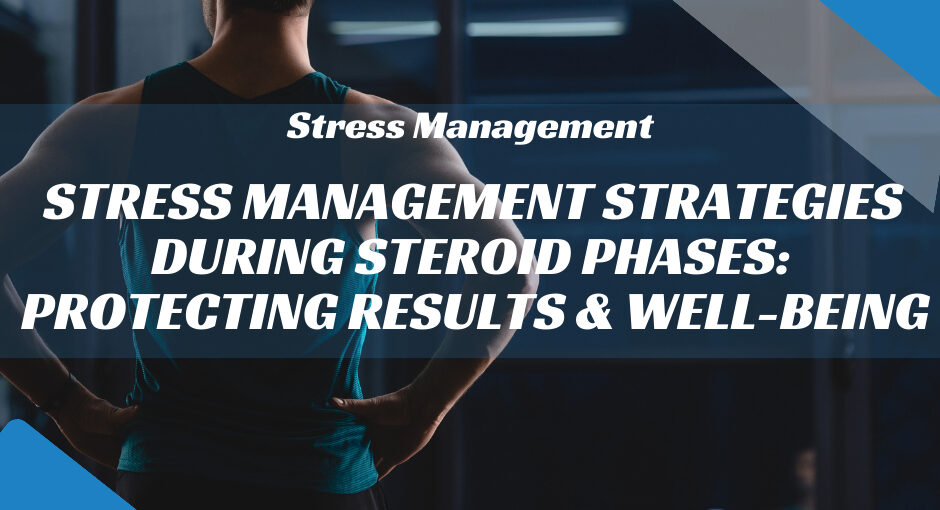Enhanced training phases push your body, mind, and recovery systems to their limits. And while many athletes focus on nutrition, training intensity, and supplementation, they often overlook the mental side of the journey. Effective Steroid Stress Management isn’t just beneficial — it’s essential for protecting your progress, performance, and long-term well-being.
At Bio Genetics USA, we believe strength isn’t measured only in muscle mass. It’s measured in balance, discipline, and the ability to maintain peak performance in all aspects of life. That’s why stress management is one of the most powerful tools an athlete can develop.
Understanding Why Stress Rises During Enhanced Training Phases
Enhanced training phases demand more from the body in every direction — physically, mentally, and metabolically. When athletes train with greater intensity, adjust their nutrition, push heavier loads, and hold themselves to higher standards, overall stress naturally increases. Stress isn’t always negative; in controlled amounts it helps drive adaptation. But when the load becomes too high, the body can struggle to maintain balance.
To understand why stress rises, we must look at both the physiological and psychological layers happening simultaneously inside an athlete’s life.
Physiological Stress: What Happens Inside the Body
Enhanced training phases heighten the body’s internal workload. As training volume or intensity increases, the body has to work harder to maintain performance and repair tissue.
1. Cortisol rises during intense workouts
High-intensity or high-volume training elevates cortisol — the body’s primary stress hormone. While normal in short bursts, prolonged elevation can interfere with recovery, sleep, and mood.
2. Higher protein turnover increases recovery demands
Muscle-building accelerates, meaning the body breaks down and rebuilds tissue more rapidly. This requires more nutrients, more rest, and more metabolic resources — increasing internal stress.
3. Nervous system fatigue accumulates
The central nervous system (CNS) drives strength, coordination, explosiveness, and focus. Heavy training taxes the CNS, and without adequate rest, athletes may feel mentally drained, shaky, or unmotivated.
4. Sleep needs increase significantly
Because the body repairs during sleep, higher training workloads require deeper, longer rest. When sleep doesn’t keep up with training demands, stress compounds quickly.
5. Appetite, energy, and mood fluctuate
Changes in meal timing, caloric intake, or macronutrient balance — whether cutting or bulking — can disrupt appetite regulation and mood stability. This can lead to irritability, low motivation, or inconsistent energy.
Physiological stress is not just about training harder — it’s about the growing list of demands the body must meet to sustain progress.
Psychological Stress: The Mental Battle Athletes Face
While physical strain is expected, the mental and emotional challenges are often underestimated. Enhanced training phases require discipline, consistency, and intense focus — all of which can create their own psychological stressors.
1. Pressure to make progress quickly
Athletes often set ambitious goals and expect fast results. When progress slows, self-imposed pressure increases.
2. Fear of plateaus or regression
Plateaus are a normal part of training, but athletes may interpret them as failure — increasing frustration or anxiety.
3. More disciplined routines can feel restrictive
Strict eating windows, structured workouts, and rigid schedules can create mental fatigue over time.
4. Life stress adds to training stress
Work, relationships, finances, and daily responsibilities don’t disappear during intense training phases. When combined, these pressures stack up.
5. Body image expectations intensify
Athletes chasing specific physique goals may experience increased self-scrutiny, comparison to others, or dissatisfaction during slower phases of progress.
Psychological stress is often silent but powerful — and when combined with physiological demands, it becomes a major factor affecting performance and well-being.
Why Understanding These Stressors Matters
Enhanced phases amplify both sides of the stress equation. Without proper stress management strategies, athletes may experience:
- Motivation Dips
- Inconsistent Recovery
- Emotional Fatigue
- Training Plateaus
- Reduced Performance
- Increased Risk Of Burnout
This is why developing a strong stress management plan is not optional — it’s a necessity for sustainable, long-term success.
How Stress Impacts Performance and Recovery
Stress isn’t inherently bad — controlled stress (training) builds strength.
The problem is uncontrolled or chronic stress.
High Stress Can Lead To:
- Fatigue and overtraining
- Mood swings and irritability
- Poor sleep quality
- Reduced strength output
- Lower motivation
- Inflammation and slower recovery
This is why athletes must learn to manage stress with intention, structure, and self-awareness.
How Anabolic Activity Interacts With Stress (Safe, Simplified Science)
Anabolic steroids influence protein synthesis, nitrogen retention, and recovery speed — but none of these enhancements work efficiently when stress is high.
High stress can:
- Blunt Recovery
- Reduce Sleep Quality (Which Affects Growth)
- Interfere With Appetite And Digestion
- Disrupt Hormonal Stability
- Increase Inflammation
In short:
Athletes who manage stress recover faster, perform better, and maintain results longer — enhanced or not.
Bio Genetics USA emphasizes this holistic approach in all performance guidance, including nutrition topics like:
👉 https://biogeneticsusa.com/blog/fiber-intake/
Major Stress Management Strategies for Enhanced Athletes


Below are safe, high-level strategies designed to support athletes without giving any actionable steroid usage guidance.
1. Prioritize Sleep as Your Primary Recovery Tool
- Your Nervous System
- Your Hormonal Balance
- Your Cognitive Focus
- Your Inflammation Response
- Your Muscle-Healing Efficiency
Why it matters:
When stress rises, sleep quality often drops first — and that instantly reduces recovery speed and training intensity.
2. Use Structured Training Intensity (Avoid All-Out Every Day)
Chronic heavy lifting increases stress hormones, exhausts the CNS, and can reduce appetite or energy. Athletes benefit from:
- Varied Training Intensity
- Incorporating Lighter Sessions
- Using Intentional Deload Periods
- Listening To Fatigue Signals
Why it matters:
Training smart protects the body from unnecessary stress-related plateaus.
3. Implement Stress-Reducing Lifestyle Habits
These are safe, universal strategies that support health — no matter the training phase.
Daily Stress-Reduction Tools
- Light stretching or mobility work
- Meditation or breathwork sessions
- Low-intensity walks
- Spending time outdoors
- Structured journaling or reflection
These techniques reduce cortisol and improve mental clarity.
Bulking vs. Cutting: How Stress Patterns Change


Stress Differences in Bulking vs. Cutting
| Phase | Common Stress Triggers | How to Manage Them |
| Bulking | Heavy meals, digestive load, high-volume training | Add fiber, hydration, gut-friendly foods, consistent sleep |
| Cutting | Low calories, hunger, fatigue, mood changes | Prioritize sleep, incorporate refeed structure, reduce overtraining |
| Recomp | Balancing energy and performance | Use flexible nutrition and moderate intensity training |
Athletes often experience more mental stress during cutting, and more physical stress during bulking. Managing both improves performance outcomes.
4. Support Gut Health to Reduce Internal Stress
Gut stress = body stress.
Many athletes underestimate how digestion influences mood, recovery, and inflammation.
Fiber (soluble + insoluble) keeps digestion smooth, prevents bloating, stabilizes blood sugar, and improves nutrient absorption — which helps reduce internal stress.
Learn more here:
👉 https://biogeneticsusa.com/blog/fiber-intake/
Why it matters:
A stressed gut sends signals to the brain, elevating cortisol and affecting motivation.
5. Protect Your Mental Environment
Athletes often experience:
- Pressure To Maintain Results
- Comparison To Others
- Worry About Progress
- Fear Of Slowing Down
Strategies to stay mentally strong:
- Limit negative social media comparison
- Create structured weekly goals
- Stay connected to fitness peers
- Celebrate small wins
- Practice self-compassion
Why it matters:
Mental well-being preserves focus, consistency, and discipline — the foundation of all long-term progress.
6. Safe, High-Level Guidance for Enhanced Training Phases
These are non-actionable, harm-reduction, education-only insights:
- Avoid extreme training loads without rest
- Maintain hydration and nutrient balance
- Monitor mood and energy changes
- Support liver and cardiovascular wellness through diet
- Never ignore prolonged fatigue or irritability
- Use bloodwork and health monitoring responsibly
This protects both performance and long-term health — the Bio Genetics USA philosophy.
Why Stress Management Protects Side-Effect Control
While stress doesn’t cause side effects, it can worsen them by:
- Impacting Digestion
- Reducing Sleep
- Increasing Water Retention
- Affecting Blood Pressure
- Elevating Cortisol
- Worsening Inflammation
Keeping stress low makes performance smoother, safer, and more sustainable.
Why Athletes Trust Bio Genetics USA
At Bio Genetics USA, we stand by three pillars:
🏆 Uncompromising Quality
Every product is sourced with transparency, consistency, and strict verification.
📚 Science-Based Education
We empower athletes with knowledge — sleep, nutrition, gut health, recovery, and enhanced performance concepts.
💬 Real Support, Real People
Customer support that understands the athlete mindset.
🔒 Secure Online Shopping Experience
Encrypted checkout, fast delivery, and reliable service every time.
Bio Genetics USA is your partner in building strength with purpose — inside and out.
Conclusion: Master Stress, Master Your Results
Stress management isn’t optional — it’s the backbone of long-term performance.
When athletes learn how to balance training intensity, sleep, recovery, digestion, and mental wellness, they unlock their strongest, healthiest, and most consistent version of themselves.
Bio Genetics USA is here to walk with you every step of that journey — with premium products, science-backed education, and a community built on discipline and growth.
✨ Control your stress. Protect your progress. Elevate your performance.
👉 Explore athlete-focused solutions at: https://biogeneticsusa.com/shop/






